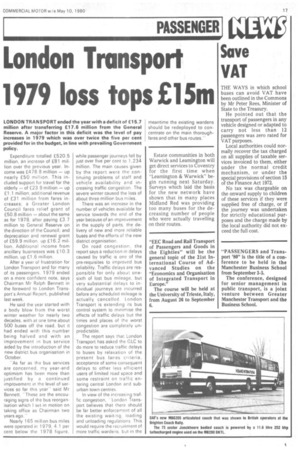London Transport 1979 loss tops £15m
Page 19

If you've noticed an error in this article please click here to report it so we can fix it.
LONDON TRANSPORT ended the year with a deficit of £15.7 million after transferring £17.6 million from the General Reserve. A major factor in this deficit was the level of pay increases in 1979 which was over twice the five per cent provided for in the budget, in line with prevailing Government policy.
Expenditure totalled £520.5 million, an increase of £81 mil lion over the previous year. Income was £478.8 million — up nearly £50 million. This included support for travel for the elderly — of £23.9 million — up £1.1 million; additional revenue of £31 million from fares in creases; a Greater London Council fares relief grant of £50.8 million — about the same as for 1978, after paying £3.7 million to General Reserve on the direction of the Council; and
depreciation and renewal grant of £59.9 million; up £16.2 mil
lion. Additional income from ancillary businesses was £10.3 million, up £1.6 million.
After a year of frustration for London Transport and for many of_ its passengers. 1979 ended on a more confident note, says Chairman Mr Ralph Bennett in the foreword to London Transport's Annual Report, published last week.
He said the year started with a body blow from the worst winter weather for nearly two decades, with at one time about 500 buses off the road, but it had ended with this number being halved and with an improvement in bus service aided by the introduction of the new district bus organisation in October.
"As far as the bus services are concerned, my year-end optimism has been more than justified by a continued improvement in the level of ser
vices so far this yearsaid Mr Bennett. -These are the encouraging signs of the bus reorgan isation which I set in motion on taking office as Chairman two years ago.
Nearly 165 million bus miles were operated in 1979, 4.1 per cent below the 1978 figure, while passenger journeys fell by just over five per cent to 1,234 million. The main causes given by the report were the continuing problems of staff and vehicle availability and increasing traffic congestion. The severe winter caused the loss of about three million bus miles.
There was an increase in the number of vehicles available for service towards the end of the year because of an improvement in the supply of parts, the delivery of new and more reliable buses and the efforts of the new district organisation.
On road congestion. the report says a reduction in delays caused by traffic is one of the pre-requisites to improved bus reliability. Traffic delays are responsible for only about onesixth of lost bus mileage, but very substantial delays to individual journeys are incurred before any scheduled mileage is actually cancelled London Transport is extending its bus control system to minimise the effects of traffic delays but the tithes and places of the worst congestion are completely unpredictable.
The report says that London Transport has asked the GLC to do more to reduce traffic delays to buses by relaxation of the present bus lanes criteria, acceptance of some consequent delays to other less efficient users of limited road space and some restraint on traffic entering central London and suburban town centres.
In view of the increasing traffic congestion, "'London Transport believes that there should be far better enforcement of all the existing waiting, loading and unloading regulations. This would require the recruitment of more traffic wardens. hut in the meantime the existing wardens should be redeployed to concentrate on the main thoroughfares and other bus routes."'




















































































































